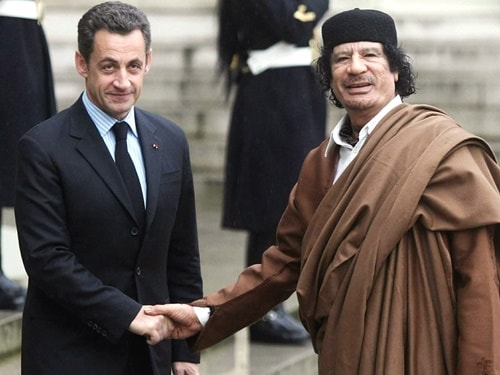The "unhealthy" relationship between the former French president and the late Libyan leader
Former French President Sarkozy initially showed goodwill in building close relations with Gaddafi's government but later supported his overthrow.
|
French President Nicolas Sarkozy welcomed Mr. Gaddafi in Paris in 2007. Photo:Rex Features. |
Former French President Nicolas Sarkozy was arrested by police on March 20 to investigate allegations that his campaign fund illegally received a donation of 60 million USD from the late Libyan leader Muammar Gaddafi in 2007. French law only allows an individual to donate a maximum of 7,500 euros (about 9,200 USD) to a presidential candidate's campaign fund. In addition, the amount of 60 million USD is also twice the maximum limit allowed for each campaign fund in France at that time.
The investigation has been underway since 2013 and Mr Sarkozy has consistently denied the allegations. Mr Gaddafi, who ruled Libya for decades, was captured and killed by rebels in 2011 after Western countries, including France, launched air strikes on Libya.
Mr. Sarkozy had a difficult relationship with the late leader Gaddafi because at first, the former French president proactively built a friendly cooperative relationship with Mr. Gaddafi's regime, but later, Sarkozy supported his overthrow.
In 2007, France was the first Western country to welcome Gaddafi since Libya decided to break its diplomatic isolation four years earlier.
According toTelegraphIn December 2007, French President Nicolas Sarkozy warmly welcomed Gaddafi in Paris despite the opposition of many domestic officials because Gaddafi was considered a dictator, sponsoring terrorism and having ambitions to develop weapons of mass destruction.
At that time, Mr. Sarkozy affirmed to a French newspaper: "Gaddafi is not a dictator in the Arab world's perception. He is the longest-serving head of state in the region. And in the Arab world, that is important."
When Gadaffi was allowed to pitch a traditional nomadic tent in the garden of the government guesthouse near the Elysee Palace, Mr Sarkozy condemned "those who criticized the Libyan leader's visit as excessive and irresponsible".
"If we do not welcome those who are on the path of seeking respect, what shall we say to those who choose the opposite path?", he said. But Mr. Sarkozy also admitted that Gadaffi "has his own personality and temperament."
The then-Elysee secretary general said Gaddafi's six-day visit had resulted in France securing contracts to sell fighter jets and Airbus aircraft to Libya worth 10 billion euros, creating 30,000 jobs in France. However, this figure was later reduced to 3 billion euros, with officials admitting that 10 billion euros was only the figure mentioned in the memorandum of understanding for the negotiation plan.
Gaddafi's first visit to France in 34 years comes after France played a key role in convincing Libya to release five Bulgarian nurses and a Palestinian doctor. The health workers, who had been imprisoned since 1999, were sentenced to death for deliberately infecting hundreds of children at a children's hospital in Benghazi, Libya, with HIV. They blamed the infection on poor hygiene practices.
Mrs. Cecilia Sarkozy, wife of former President Sarkozy, flew to Libya twice in July 2007 to meet Gadaffi and persuade him to release the medical staff.
In August 2007, Mr. Sarkozy denied any connection between France's mediation in Gadaffi's acceptance of the release of the medical staff and the Gadaffi government's subsequent decision to sign a 300 million euro contract to purchase anti-tank missiles and radio communication systems from the French-based European Aerospace Industries (formerly known as Airbus).
"That contract has nothing to do with the release of the nurses from Libya. What are they criticizing me for? Signing the contract? Creating jobs for French workers?", Mr. Sarkozy asked.
He also affirmed that the agreement between France and Libya on a civil nuclear energy cooperation program was completely unrelated to the return of nurses and doctors.
When criticized by critics who said France was helping Libya gain access to nuclear weapons, Mr Sarkozy explained that a nuclear reactor to help desalinate seawater, to turn it into drinking water in Libya, could help "deal with terrorism and fanaticism" because it would help Libya develop economically.
However, in March 2011, after being criticised for not speaking out strongly in support of the Arab Spring revolutions in Egypt and Tunisia, Mr Sarkozy was one of the first Western leaders to call on Mr Gaddafi to step down. Libyan soldiers were accused of shooting and killing hundreds of pro-democracy protesters in Benghazi, in February 2011.Next, Mr. Sarkozy put France on the front line of NATO airstrikes against Gaddafi regime soldiers, helping Libyan rebels overthrow Gaddafi in August 2011.



